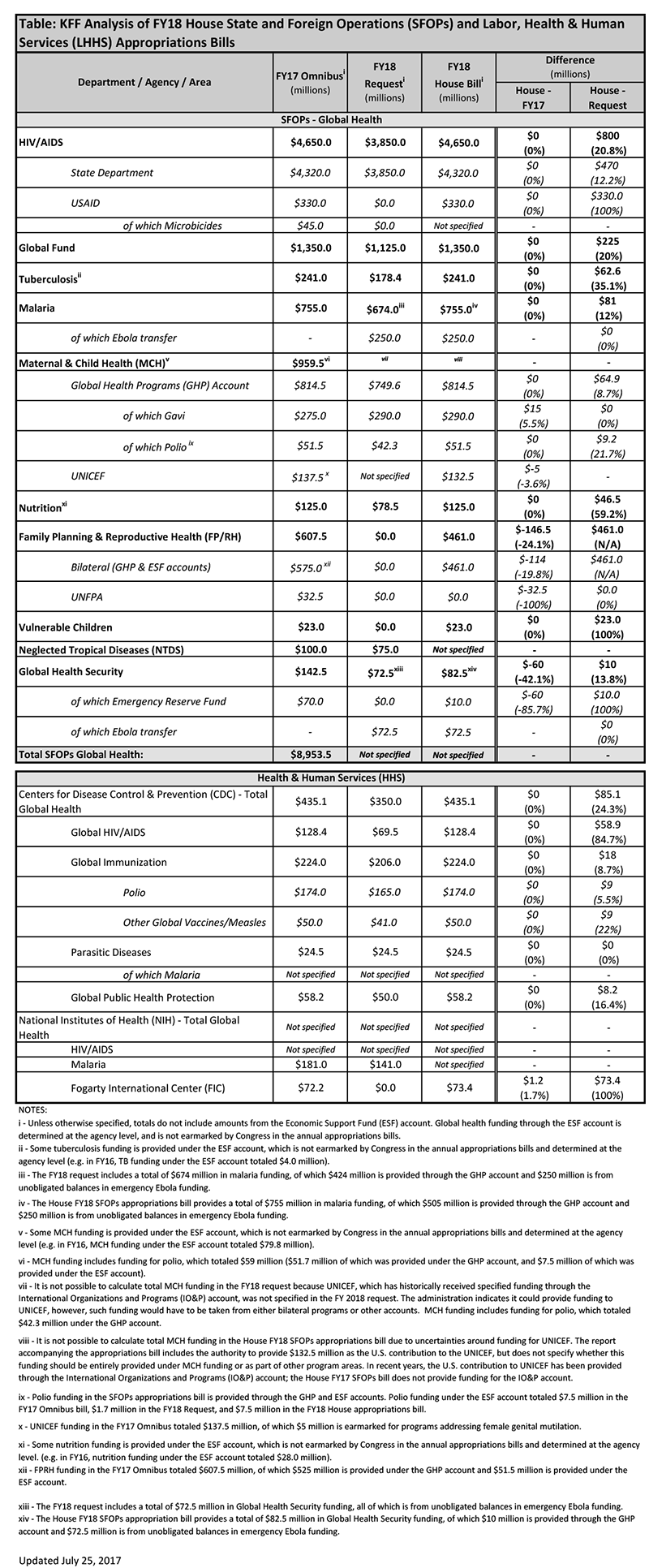House Appropriations Subcommittees approve FY 2018 State & Foreign Operations (SFOPs) and Health & Human Services (HHS) Appropriations Bills
On July 19, 2017, the House Committee on Appropriations approved both the FY 2018 State & Foreign Operations (SFOPs) and the FY 2018 Labor, Health & Human Services (LHHS) appropriations bills. The SFOPs bill includes funding for U.S. global health programs at the State Department and the U.S. Agency for International Development (USAID), while the LHHS appropriations bill includes funding for global health programs at the Centers for Disease Control and Prevention (CDC) and the National Institutes of Health (NIH).[i]
Key highlights from the bills are as follows (see table for additional detail):
- Funding provided to the State Department and USAID through the Global Health Programs (GHP) account, which represents the bulk of global health assistance, totaled $8.3 billion, $404 million (5%) below the FY17 enacted level and $1.8 billion (28%) above the President’s FY 2018 request. Some of this decrease was offset by transfers from unspent emergency Ebola funding.
- Funding provided to CDC for global health matched the FY 2017 enacted level ($435.1 million) and was $85.1 million (24%) above the President’s FY 2018 request.
- Funding for the Fogarty International Center (FIC) at the National Institutes of Health (NIH) totaled $73.4 million, a slight increase above the FY 2017 enacted levels ($72.5 million); FIC was eliminated in the FY18 Request.
- Details on global health funding in the House SFOPs appropriations bill are as follows:
- Funding for most global health programs at State and USAID remained flat in the House FY 2018 SFOPs appropriations bill compared to the FY 2017 enacted level; funding for all program areas were above the President’s FY 2018 Request.
- Bilateral HIV funding through the President’s Emergency Plan for AIDS Relief (PEPFAR) is $4,650 million in the House FY18 bill, matching the FY17 level and $800 million above the President’s FY 2018 request.
- The bill included $1,350 million as the U.S. contribution to the Global Fund to Fight AIDS, Tuberculosis and Malaria (Global Fund), matching the FY17 level and $225 million above the President’s FY 2018 request.
- Funding for tuberculosis totaled $241 million, matching the FY17 level and $62.6 million above the FY 2018 request.
- While the bill provides a total of $755 million for malaria activities, matching the prior year level; $250 million of this total is provided through a one-time transfer of unspent emergency Ebola funding.
- The bill provides $82.5 million in total funding for Global Health Security (GHS), of which $72.5 million provided through a one-time transfer of unspent emergency Ebola funding. The FY18 GHS total funding level is $60 million below the FY17 level and $10 million above the FY18 Request.
- The bill includes $814.5 billion for maternal and child health (MCH), matching the FY17 level and $65 million above the FY18 Request.
- Gavi, the Vaccine Alliance, which is included under maternal and child health (MCH) funding, was $15 million above the FY 2017 enacted level ($275 million) and matched the President’s FY 2018 request ($290 million).
- The bill includes the authority to provide $132.5 million as the U.S. contribution to the UNICEF, but does not specify whether this funding should be provided under MCH funding or as part of other program areas. In recent years, the U.S. contribution to UNICEF has been provided through the International Organizations and Programs (IO&P) account; the House FY17 SFOPs bill does not provide funding for the IO&P account.
- Funding for nutrition totaled $125 million in the bill, matching the FY17 level and $46.5 million (59%) above the FY 2018 request.
- Funding for vulnerable children totaled $23 million, matching the FY17 level. Funding for vulnerable children was eliminated in the FY 2018 request.
- Funding for neglected tropical diseases (NTDs) was not specified in the bill.
- Bilateral Family Planning and Reproductive Health (FP/RH) funding in the bill totaled $461 million from all accounts, which is $114 million below the FY17 enacted level ($575 million); funding for FP/RH was eliminated in the FY18 Request.
The SFOPs bill also included the following policy provisions:
- Seeks to codify the expanded Mexico City Policy (also known as the “Global Gag Rule”) in law, as reinstated by President Trump via executive order on January 22, 2017.
- Prohibits funding for the United Nations Population Fund (UNFPA). In FY17, Congress provided $32.5 million for the U.S. contribution to UNFPA, but the administration invoked the Kemp-Kasten amendment to withhold funding for UNFPA (see here for more information on Kemp-Kasten).
Resources:
- FY2018 State and Foreign Operations Appropriations Bill – Full Committee Draft
- FY2018 State and Foreign Operations Appropriations Bill – Full Committee Report
- FY2018 Labor, Health and Human Services, and Education Appropriations Bill – Full Committee Draft
- FY2018 Labor, Health and Human Services, and Education Appropriations Bill – Full Committee Report
The table (.xls) below compares the FY 2018 House SFOPs and LHHS appropriations bills to the FY 2017 enacted funding amounts as outlined in the “Consolidated Appropriations Act, 2017” (P.L. 115-31; KFF summary here) and President’s FY 2018 request (KFF summary here).
[i] Total funding for global health is not currently available as some funding provided through USAID and DoD is not yet available.
The KFF Daily Global Health Policy Report summarized news and information on global health policy from hundreds of sources, from May 2009 through December 2020. All summaries are archived and available via search.
